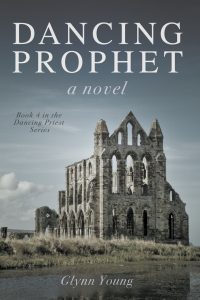
“Josh,” Zena said, “there’s something in Michael that speaks to you, and I suspect speaks deeply. He thinks the world of you, but it’s about who you are. He’s grateful for what you’ve done and what you can do, but it’s more about you as a person. He likes you, Josh. You’re not used to having someone who simply likes you as a friend.” She paused. “And you may have to ask yourself what your new faith means in the context of government politics.”
- From Dancing King
Photograph by Dominik Vanyi via Unsplash. Used with permission.


 Dancing Prophet is fiction, but like all fiction, it can’t help but reflect the times in which it’s written. When the history of our times comes to be written, it may be title (or subtitled) “The Age of Institutional Crisis.” Our government structures aren’t working; the sorry spectacle of a U.S. Senator questioning a candidate for the Supreme Court about the references to body noises in his high school yearbook isn’t even funny as much as it is tragic.
Dancing Prophet is fiction, but like all fiction, it can’t help but reflect the times in which it’s written. When the history of our times comes to be written, it may be title (or subtitled) “The Age of Institutional Crisis.” Our government structures aren’t working; the sorry spectacle of a U.S. Senator questioning a candidate for the Supreme Court about the references to body noises in his high school yearbook isn’t even funny as much as it is tragic. This is the world partially depicted in Dancing Prophet. Michael Kent-Hughes has been thrust into a position he never expected and never sought. He is not only dealing with ecclesiastical failure; he is also dealing with politicians increasingly reluctant to take responsibility and a London governing authority that ceases to work due to political disfunction.
This is the world partially depicted in Dancing Prophet. Michael Kent-Hughes has been thrust into a position he never expected and never sought. He is not only dealing with ecclesiastical failure; he is also dealing with politicians increasingly reluctant to take responsibility and a London governing authority that ceases to work due to political disfunction.
 Writing a fiction series seems to have become popular in the 19thcentury. It’s not the same thing as serial publication, which is how Charles Dickens published his novels – a chapter per issue of a periodical. One of the best-known series in the 19thcentury was the Chronicles of Barsetshire by
Writing a fiction series seems to have become popular in the 19thcentury. It’s not the same thing as serial publication, which is how Charles Dickens published his novels – a chapter per issue of a periodical. One of the best-known series in the 19thcentury was the Chronicles of Barsetshire by  What happened was this: as I constructed what became the world of Michael and Sarah Kent-Hughes, the construction grew, it expanded over time, it became more elaborate and detailed, and it became too big to be contained in only a single book. What was one rather large manuscript was transformed into four novels.
What happened was this: as I constructed what became the world of Michael and Sarah Kent-Hughes, the construction grew, it expanded over time, it became more elaborate and detailed, and it became too big to be contained in only a single book. What was one rather large manuscript was transformed into four novels.

 The kidnapper was a man named
The kidnapper was a man named  In 2012, in a conversation with my publisher about writing life after A Light Shining, I mentioned this story. A few days later, he sent me a press story from England. A small pedophile ring had been uncovered within the Church of England. He wanted to know if I had “pre-written history.”
In 2012, in a conversation with my publisher about writing life after A Light Shining, I mentioned this story. A few days later, he sent me a press story from England. A small pedophile ring had been uncovered within the Church of England. He wanted to know if I had “pre-written history.”